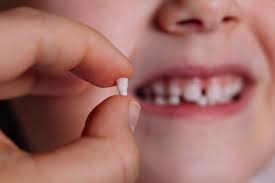
Losing a first tooth is a rite of passage and it usually happens at around 6-years-old. The tooth comes loose then falls out leaving a gap for the adult tooth to come through. This generally continues until age 12 when all their baby teeth have fallen out.
While you (your child more likely) are patiently waiting for the tooth fairy to arrive, they may have some questions about what’s normal and what isn’t when it comes to losing baby teeth. We have got you covered, below is everything you need to know.
What is the ‘normal’ process?
Over the course of their childhood, your child will lose 20 baby teeth, making way for 32 adult teeth. The best thing you can do when this starts to happen is to let nature take its course and let the teeth fall out on their own.
But this is easier said than done. Many children can become impatient for their tooth to fall out and may ask for your help, especially when it becomes very loose. While you can help your child, we recommend you only slightly wiggle/wobble the tooth and over a few days it should fall out.
Once a tooth falls out, the gum surrounding it may be a little tender and sore, which is normal. It is still important to keep up the tooth brushing and oral hygiene routine — making sure to take care while brushing around those sensitive areas.
What if my child is feeling anxious?
While most children are excitable and have a positive outlook about the loss of their baby teeth, according to research 20% respond negatively. If your child does feel anxious or scared about losing a tooth, schedule an appointment with us which will allow the dentist to explain to your child that this is a very normal process and provide extra reassurance.
It has also been proven that kids can easily pick up on anxiety or fear in their parents. So, while it can be a daunting step, it is important that parents keep their fears in check, maintaining a light-hearted approach.
What if the tooth isn’t coming loose?
If your child’s wobbly tooth gets stuck and you can start to see the adult tooth under or at the side of it, seek help from a dentist who will be able to remove it.
Making sure you are scheduling regular visits with your child’s dentist is the best way to ensure that you are taking care of their new teeth growth and development.
Still have questions…
As your local dentist we are always here to help. If you have any questions or concerns about your children’s teeth, book an appointment to see us






